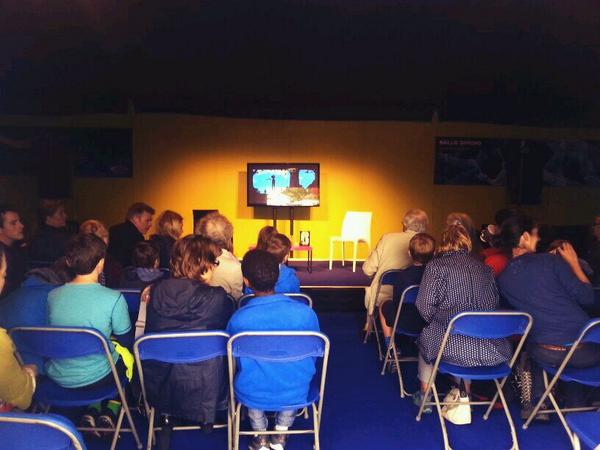“The individual fairy tale is not itself a myth, but it presupposes a mythic framework of surprise, dependence or vulnerability, the balancing of anxiety with expectation: a thumbnail sketch of human experience in a bewildering natural and emotional environment.” (“why we need fairy tales now more than ever” by Rowan Williams, New Statesman, December 22, […]
I’ve just returned from Edinburgh on a train packed to the gills with rucksacks, sleeping bags, and the odd piece of bin-bag wrapped set. Yes, it’s festival time and the returning festival-goers include, as they have for the last twenty-two years, me.
I’ve also been a participant this year – talking at the Edinburgh Book Festival, just one of seven festivals that completely take over the Scottish capital every August. At the same time as I was talking to 80 children about The Dark Wild yesterday, Alex Salmond was discussing the referendum next door, and had you struck out in almost any direction from Charlotte Square in search of alternative fare, I guarantee you could have found some event to suit your palate.
 |
| My audience at the Edinburgh Book Festival 2014 |
I wasn’t with my partner on this occasion, who was giving a talk on a forgotten Elizabethan play…at another festival, Wilderness, in Oxfordshire. Wilderness is part of a new crop of ‘boutique’ festivals offering a midsummer’s assortment of revels from hip bands to literary events to Madhatter’s Teaparties. The lakes and Arcadian lawns of Wilderness are a far cry from the cobbles and closes of Edinburgh, although this weekend they shared the same weather.
Earlier this summer we
didgo to the same festival, to the brand new
Curious Arts – a kind of Voewood-on-Sea, in the charming grounds of Pylewell Park, a Regency mansion with a view
from the terrace straight down to the Isle of Wight. You could dance to Ed Harcourt in the evening, listen to Lady Antonia Fraser on the Great Reform Act after breakfast, hunt a Jabberwocky in the Aboretum all afternoon, and finish the day with a gin cocktail leaning over a crumbling balustrade watching ships pass on the Solent.
 |
| Pylewell Park, the setting for the Curious Arts Festival |
All very charming and civilised. But as I returned for the umpteenth time from the granddaddy of all festivals last night – I found myself meditating on the true attraction of such gatherings. What’s the point of a festival?
Let me first declare an interest in this British summer sport. I began my career programming a large theatre on the Edinburgh Fringe,
the Pleasance (of which I am now a Trustee). Each year we have enough shows in enough different rooms to momentarily make us one of the largest arts venues in Europe.
I’ve sat in the sun at Hay and waded through the mud at Latitude. I’ve spoken at a tiny theatre festival that just takes over three floors of one building in Suffolk and a new book festival in Devon which was just a room in a library.
Later this year I’ll be leading a wildlife walk at
Bath Festival and then dashing off to sit on a panel at Cheltenham. You can festival it up from Port Elliot
to Adelaide to Dubai, if you want to.
It would seem that we are at peak Festival, with over 700 events taking place this year classified as one, about 300 of them literary.
As a writer, you will be told many things about festivals, as I know theatre companies, musicians and comedians are told about theirs. You will be told they are essential for profile, that ‘festivals are the new bookshops’ and a great way for connecting with readers.
I don’t wholly dispute those things. Being in a Festival programme, especially an established one, does lift perception of you and your titles. Sales wise I’m less sure – I had a sold out talk at Edinburgh yesterday, in a 75 seat room, and probably sold 20 odd books, which is great - but it’s not the sole reason I went.
You certainly don’t go for the money. Some Festivals, like Bath and Edinburgh offer a token fee, and some like Hay, offer a case of wine and a flower. And as someone involved with the running of a festival venue, I can report that the ever increasing rental, accommodation, promotional, regulatory and staff costs associated with mounting one of these temporary gatherings mean profits are only ever normally found behind the bar rather than the box office.
It’s not cheap for audience members either. Individual events may carry an average ticket price of £8-10 but the travel, accommodation, taxi and food/drink bill means the minimum festival tab comes close to the £100 prices offered by the all inclusive weekend events like Curious Arts, and can be often more - if you visited Edinburgh all week, for example.
Why do we all go and what do we take away?
A dull critic of this pastime might argue that at best audience members take away an empty wallet and often a hangover, and we take away some book sales and inclusion in a programme mailing list.
Of course, all of us are in search of something much more profound.
Festivals may be promoted effectively but I would not place them under the heading of ‘Effective Promotion’ for any artist. There are numerous more sober and less fun ways to do that – just speak to your publisher’s sales and marketing department. But festivals are also fun for them to attend too.
Festivals, especially the summer ones, satisfy a much deeper urge in us to ‘gather.’ Writing, as we all know, can be a damnably lonely business, just you, your ideas and a cold screen all day long. School visits are often hectic and at best your longest conversation with an adult might be five minutes on logistics over a coffee in the staff room.
I think all of us, from writers to actors to comedians to singers to audience members, go to festivals primarily to talk, and to connect. We need our events, sure, we need a reason to gather, our cover story; but the real business of a Festival takes place in the green room, the author’s yurt, the performer’s bar and the pop-up café franchise.
The classic image of a festival is a big tent, and that is the heart of their appeal. Where else can one talk to Archbishop Emeritus Rowan Williams, the Gruffalo and First Minister Salmond all in one room? Even if I chose not to. They are harvest festivals without the back breaking labour (unless perhaps you’re in an acrobatic troupe), weddings for all, and the very best are always tinged with midsummer madness.
 |
| The Gruffalo loses his head at all the excitement in the Edinburgh Author's Yurt |
We gather, we discover, share ideas, news, worries and gossip like crazy. Twitter handles become three dimensional, books expand to reveal the lives behind them, and readers are no longer scary anonymous Amazon commenters.
We might sell the odd book or register with a bookseller who didn’t know us before. All of which is great and worthwhile. But next time your publisher invites you to a festival, don’t worry too much about the fee or whether the sales will be worth it, just gather in the tent (ideally under a super moon) and enjoy the craic.
Piers Torday
@PiersTorday
www.pierstorday.co.uk
If anyone has any memorable Festival experiences, good or bad, do share them below!
Shari’a in the West is a collection of essays, edited by Rex Adhar and Nicholas Aroney, written by leading scholars from a range of countries, academic fields, and political and faith positions in reaction to some public lectures given by the Archbishop of Canterbury and the Lord Chief Justice of England and Wales regarding the practice of Shari’a Law in the Western world. The excerpt below is taken from John Milbank’s essay ‘The Archbishop of Canterbury: The Man and the Theology Behind the Shari’a Lecture’ and focuses on the Muslim reaction to Dr Williams’s speech.
Over the first two weeks of February 2008 in the United Kingdom, a sizable controversy was stirred up by a lecture given to the Royal Courts of Justice by the Anglican Archbishop of Canterbury, the Rt Rev Rowan Williams, entitled ‘Civil and Religious Law in England: A Religious Perspective’, and a prior interview which he gave to the BBC Radio 4 news programme, ‘The World at One’. In the course of both the talk and the interview, the Archbishop suggested that certain extensions of Shari’a law in Britain were both ‘unavoidable’ and also desirable from the double point of view of civil cohesion and the defence of the ‘group rights’ of religious bodies.
Public reactions to this pronouncement were both swift and overwhelmingly negative. The Prime Minister distanced himself from the remarks, declaring that there could be but one common law for all in Britain, which must be based upon ‘British values’. Most political leaders from all the main British political parties more or less followed suit. The popular press suggested that the Archbishop was clearly as mad as his hirsute appearance had always led them to suppose, while the quality press by and large accused him of extreme political naivety, obscurity, and misplaced academicism. Certain commentators at the higher end of the media spectrum dissented from the latter verdict, and allowed that Dr Williams had bravely raised issues of great future importance. They also conceded to him that some supplementary elements of the religious law of all three monotheistic traditions were already incorporated by British justice and that further extensions of this accommodation should not be ruled out.
Yet, with near unanimity they declared that he had gone too far in apparently condoning parallel legal systems with an option for people to have certain cases considered either by a civil or religious tribunal. Any such possibility was also condemned by the Catholic Cardinal Archbishop of Westminster, the Rt Rev Cormac Murphy-O’Connor, and this was discretely echoed by the majority of even the Anglican bench of bishops. It was reported that only three per cent of the members of the Synod which helps to govern the Anglican Church in England favoured the Archbishop’s opinion, while up and down the country, on the Sunday following the initial furore, priests found themselves forced in their sermons to make some sort of allusion to it, and were only received well by their congregations if they wholeheartedly confirmed their support for one common law for all people resident in England. The population at large, encouraged by some sections of the media, predictably associated the word ‘Shari’a’ with the chopping-off of hands and the punishment of raped women as fornicators—a reaction which, it seems, the Archbishop’s advisors had predicted and warned him against.




